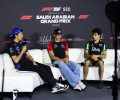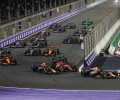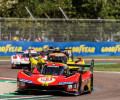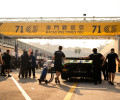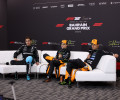Race control: Meet Joana De Sousa Falcão
Over the seasons, the FIA Karting has strengthened its race control solutions to ensure greater sporting fairness. Some 35 cameras are now installed on and around the track, as well as in strategic locations such as the pre-grid and the technical area.
While the drivers take to the track, several people work behind the scenes to view the cameras and examine any contentious actions, in constant contact with the race directors, stewards, timekeepers and all the other personnel involved. Joana De Sousa Falcão is one of these officials, and she has made her mark with her calm and serious approach.
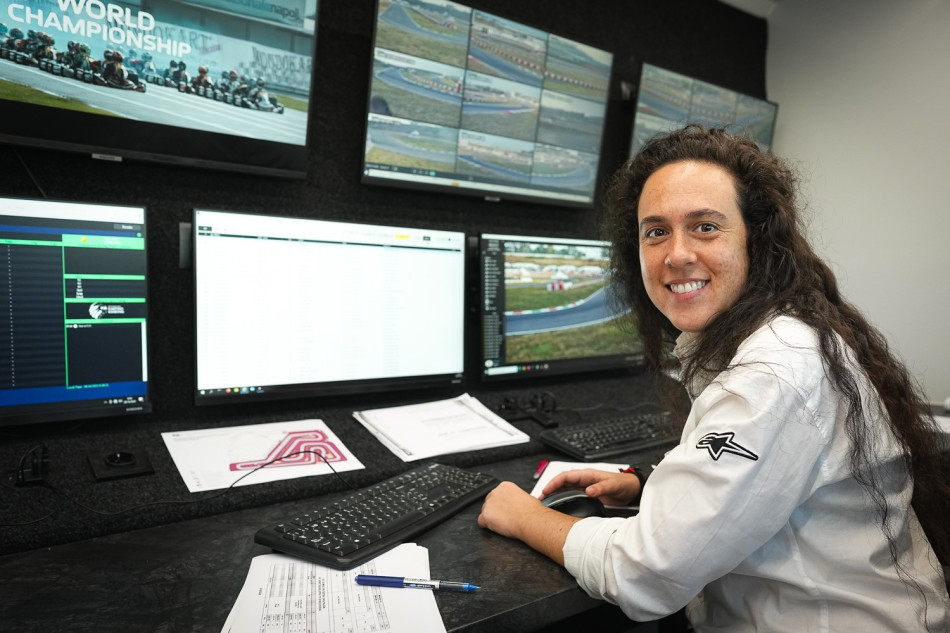
Interview
Joana Sousa, can you introduce yourself?
"I'm from Portugal and I grew up at the circuits, as my father and uncle have been involved in motor sport for many years. My uncle is Victor Sousa, and he is regularly called upon by FIA Karting as an international steward for World and European Championship events. My father is a national steward and follows competitions in Portugal, both in karting and other racing categories. I often accompanied him to the circuits and became interested in this activity. I started out as a track marshal in a club on the Leiria circuit, north of Lisbon. I then became secretary to the stewards and trained myself to take on this role."
When was your first FIA Karting meeting?
"At the end of 2021, at the OK and OK-Junior World Championship in Campillos. I was then asked to continue in 2022 and 2023."
What qualities do you need to do this job?
"First of all, you need to have a good knowledge of karting, the way races are run, event management and the regulations. I think I have needed a lot of experience in this sport to be able to take on this role and withstand the pressure. You have to be able to react quickly and correctly, remaining concentrated, impartial and fair in order to analyse a situation perfectly, then produce a precise report so that the officials around me can process the information accurately."
So you have an overall view of the start from the pre-grid to the finish and going through the scales at the weight check. How do you rate the development of the race control system?
"We have more than 35 high-definition cameras and numerous control screens, which allow us to analyse exactly what has happened. Freezing images, zooming in and out, precise adjustments to the speed at which images scroll, and so on. FIA Karting has modern equipment for perfect race monitoring. I have to say that I work in excellent conditions. Along with my two other colleagues, we have to manage a huge flow of information. Race weekends are very intense and the days are long. For example, on Saturday at the World Championship in Franciacorta, we analysed more than 100 race incidents at the request of the race directors, while keeping an eye on our cameras to monitor other possible actions. We can check whether drivers have anticipated the start, gone out of their lane or overtaken under a yellow flag. We can also ask the race directors to display a warning flag if necessary. After the finish, we monitor whether a driver tries to put his front fairing back on if it has moved during the race. In this case, the penalty is clear: exclusion from the meeting."
It's a role that requires a lot of travelling, isn't it?
"If you add up all the events I'm asked to officiate at, i.e. FIA Karting and other events, that represents between 20 and 25 meetings, in addition to my usual work in Portugal. I frequently have to take days off to come to the circuits. I spend a lot of weekends away from home, but it's exciting and interesting."
Is it an advantage or a disadvantage to be a woman in this still very male-dominated world?
"Neither. I think we all want to be the best officials we can be, whether we're men or women. There's no difference. I'm the only woman on track, but I get on well with my colleagues and the rest of the team."

 Facebook
Facebook Twitter
Twitter